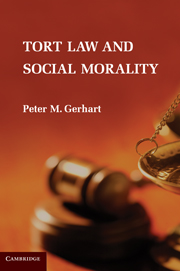1 - Law as a Social Institution
Published online by Cambridge University Press: 04 August 2010
Summary
THE COORDINATION PROBLEM
Tort law provides an institutional mechanism for reconciling conflicting claims of people over things that are important to them: freedom of action, bodily security, property, and emotional well-being. Human interaction entails both conflict and cooperation. As the number of people and interdependencies grow, the potential interference between people grows, and so too does each person's knowledge that his interests and decisions potentially interfere with the well-being of others. Sometimes the issue is apparent conflict; people want to be in the same place at the same time. They want to lay claim to the same resources. In addition, people want to protect their freedom to choose relationships, hoping that others will look for authorization before interfering with their relational freedom. In other instances, human interaction is cooperative. Human interdependence comes from social bonds that are formed to improve individual well-being; individuals rely on those bonds. People form relationships and communities, those relationships and communities entail explicit or implicit commitments among people, and these commitments improve each person's lot by allowing each person to rely on the commitments of others. At times, those commitments lead to conflicts over the terms of commitment.
Such conflicting claims between people are often irreconcilable in the sense that to honor the claim of one person would disable society from fully honoring the claim of another person.
- Type
- Chapter
- Information
- Tort Law and Social Morality , pp. 3 - 23Publisher: Cambridge University PressPrint publication year: 2010



